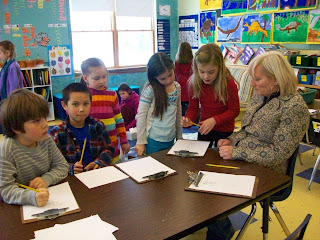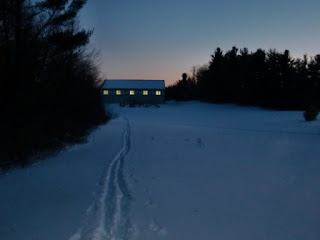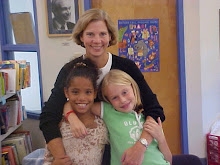4-5's performed their version of "It's a New Year" at assembly.
Friday, January 28, 2011
Wednesday, January 26, 2011
Shaping our destiny
Finally warm enough to head outside!
Jen '08 and Imani, Zali, and Peter '10 all visited today.
President Obama promoted study of STEM topics (science, technology, engineering, math) in his State of the Union last night.
We have made the investment in science at Parker - and in STEM. It really starts in Pre K: exploring materials and states of matter, building with a huge variety of materials, collections of outdoors treasures... Inquiry and experimentation - asking questions - are the main focus. Having a science teacher in the elementary years as we do is unusual in schools.
We have 4 alumni visiting today. Peter has done so well in biology as a freshman that his teacher gave him the labs to perform independently and he took the Regent Exam this week. These students are motivated questioners. Just what the president ordered.
"We are the first nation to be founded for the sake of an idea—the idea that each of us deserves the chance to shape our own destiny. That's why centuries of pioneers and immigrants have risked everything to come here. It's why our students don't just memorize equations, but answer questions like 'What do you think of that idea? What would you change about the world?' "
Education Week talks about it further.
Jen '08 and Imani, Zali, and Peter '10 all visited today.
President Obama promoted study of STEM topics (science, technology, engineering, math) in his State of the Union last night.
We have made the investment in science at Parker - and in STEM. It really starts in Pre K: exploring materials and states of matter, building with a huge variety of materials, collections of outdoors treasures... Inquiry and experimentation - asking questions - are the main focus. Having a science teacher in the elementary years as we do is unusual in schools.
We have 4 alumni visiting today. Peter has done so well in biology as a freshman that his teacher gave him the labs to perform independently and he took the Regent Exam this week. These students are motivated questioners. Just what the president ordered.
"We are the first nation to be founded for the sake of an idea—the idea that each of us deserves the chance to shape our own destiny. That's why centuries of pioneers and immigrants have risked everything to come here. It's why our students don't just memorize equations, but answer questions like 'What do you think of that idea? What would you change about the world?' "
Education Week talks about it further.
Tuesday, January 25, 2011
The redemptive process of collaboration
Trying, failing, a community working together, collaboration. Here is what David Brooks had to say about our gratitude for this process:
...every sensible person in public life also feels redeemed by others. You may write a mediocre column or make a mediocre speech or propose a mediocre piece of legislation, but others argue with you, correct you and introduce elements you never thought of. Each of these efforts may also be flawed, but together, if the system is working well, they move things gradually forward.
Each individual step may be imbalanced, but in succession they make the social organism better.
As a result, every sensible person feels a sense of gratitude for this process. We all get to live lives better than we deserve because our individual shortcomings are transmuted into communal improvement. We find meaning — and can only find meaning — in the role we play in that larger social enterprise.
More about this article from Quantum Progress
Friday, January 21, 2011
Awesome Parker parents
Parker parents know how to make us feel appreciated! Parents and grandparents made a scrumptious feast for the teachers and staff on Thursday. And they stayed with the students while the teachers feasted. There was plenty left to be taken home for dinner, too! Thank you to all of our awesome parents, who not only cook, they drive, raise money, pitch in, shelve books, serve on our Board, come to meetings, give whenever asked, and are our unfailing partners in educating the amazing children of Parker. Thank you, thank you!
Snow day activity
To Really Learn, Quit Studying and Take a Test The title is a bit misleading, but the concept rings true. This study shows that writing about what you have just read makes the topic stick in your brain longer.
Because the act of writing causes the writer to analyze information, it makes sense that it allows for better recall. "...the struggle involved in recalling something helps reinforce it in our brains."
So get out those reading-response journals, kids! After a romp in the snow, curl up in a warm blanket with a cup of hot cocoa and a book. Read, then write. Great activity for a snow day!
Because the act of writing causes the writer to analyze information, it makes sense that it allows for better recall. "...the struggle involved in recalling something helps reinforce it in our brains."
So get out those reading-response journals, kids! After a romp in the snow, curl up in a warm blanket with a cup of hot cocoa and a book. Read, then write. Great activity for a snow day!
Wednesday, January 19, 2011
Boys and sticks
Haven't you always wondered? Why do boys like sticks? Slate answers: http://www.slate.com/id/2280989/
Tuesday, January 18, 2011
The great parenting debate
Why Chinese Mothers Are Superior
Amy Chua is a Wimp
The Chinese Mom Backlash
Amy Chua's book and a Wall Street Journal article have caused a major parenting debate storm! Who does it better? Chinese-style parents or American parents?
Some debaters point out that while American parents look longingly at test scores in Asian nations, many Chinese mothers (not Yale professor Chua) wish for more creativity and choice for their children.
David Brooks argues that it's not the softer parenting style of American mothers, but Chua, who never let her daughters go to sleepovers or do crafts, who's the wimp. "She doesn't understand what's cognitively difficult and what isn't. Practicing a piece of music for four hours requires focused attention, but it is nowhere near as cognitively demanding as a sleepover with 14-year-old girls."
Cooperation and ingenuity are developed from tons of practice. Because functioning well in a group is really hard. Ask any third grader at the end of a school day spent finalizing essays and putting together a dinosaur museum at Parker. Then look at how their eyes shine with satisfaction and accomplishment on opening day.
Parent, John Arnason sent me this photo he took at dusk on Parker's trails. "It was a beautiful ski by moonlight. Just me and the owls," he said. No debate there.
Amy Chua is a Wimp
The Chinese Mom Backlash
Amy Chua's book and a Wall Street Journal article have caused a major parenting debate storm! Who does it better? Chinese-style parents or American parents?
Some debaters point out that while American parents look longingly at test scores in Asian nations, many Chinese mothers (not Yale professor Chua) wish for more creativity and choice for their children.
David Brooks argues that it's not the softer parenting style of American mothers, but Chua, who never let her daughters go to sleepovers or do crafts, who's the wimp. "She doesn't understand what's cognitively difficult and what isn't. Practicing a piece of music for four hours requires focused attention, but it is nowhere near as cognitively demanding as a sleepover with 14-year-old girls."
Cooperation and ingenuity are developed from tons of practice. Because functioning well in a group is really hard. Ask any third grader at the end of a school day spent finalizing essays and putting together a dinosaur museum at Parker. Then look at how their eyes shine with satisfaction and accomplishment on opening day.
Parent, John Arnason sent me this photo he took at dusk on Parker's trails. "It was a beautiful ski by moonlight. Just me and the owls," he said. No debate there.
Monday, January 17, 2011
It's about the students
Wellesley College professor and author of Inside School Turnarounds, Laura Pappano, wrote recently in the Christian Science Monitor that what really makes the difference for schools is when teachers connect with students.
"When you talk with students about school turnaround, you realize how much this is about them – not just the school’s data points. What changes their paths isn’t a formula or a grueling push for a better profile. It’s a connection, a context, a caring."
Personal connection and caring are crucial for learning - along with high expectations for each individual. How did these ideas get lost in the general culture of schools? Why are business-type goals and high-stakes testing to measure school success considered ways to make learning better for individuals?
In our small environment at Parker, all our connections: teacher - student, student - student, teacher - parent, parent - parent make the difference. Knowing each other and being a community with shared goals is crucial to the end result. Learning, success, satisfaction, and confidence soar!
"When you talk with students about school turnaround, you realize how much this is about them – not just the school’s data points. What changes their paths isn’t a formula or a grueling push for a better profile. It’s a connection, a context, a caring."
Personal connection and caring are crucial for learning - along with high expectations for each individual. How did these ideas get lost in the general culture of schools? Why are business-type goals and high-stakes testing to measure school success considered ways to make learning better for individuals?
In our small environment at Parker, all our connections: teacher - student, student - student, teacher - parent, parent - parent make the difference. Knowing each other and being a community with shared goals is crucial to the end result. Learning, success, satisfaction, and confidence soar!
Friday, January 14, 2011
Are boys and girls hardwired differently?
Experts disagree on this. NPR discussion ensues.(You can listen in...)
What do we see in school? In the Pre K, generally, there seem to be differences in how boys and girls play, but there are always exceptions. Or maybe it's all in the way we have been acculturated to think about it...
Boys and girls both love skiing and reading!
What do we see in school? In the Pre K, generally, there seem to be differences in how boys and girls play, but there are always exceptions. Or maybe it's all in the way we have been acculturated to think about it...
Boys and girls both love skiing and reading!
Tuesday, January 11, 2011
Thought, care and planning avert chaos
60 First Graders, 4 Teachers, One Loud New Way to Learn ...It's hard to tell what the thinking was for this experiment in learning in Brooklyn, but my first thought was that it seems chaotic, and not very well planned.
"The school stresses student independence over teacher-led lessons, scientific inquiry over rote memorization and freedom and self-expression over strict structure and discipline." Laudable goals that Parker teachers could agree with, but our teachers pull it off with careful planning and considerable finesse.
Responsive Classroom gives our teachers a consistent framework for establishing caring classrooms, allowing all children to learn. With a basis in respect, learning knows no bounds!
2-3's are pictured here with a Growing Friend from Rensselaer County ARC, learning together about being human.
2-3 teacher Lynn says,
Getting acquainted with new people—and further, with individuals who have physical and cognitive differences—can be awkward. You would have been so impressed with how gentle, positive, and helpful each child was...Everyone agreed we had gotten to know Renee, Connie and Jessica better. We are all learning how to interact, when to help, when to stand back, and how to keep conversations going with new people. I was so very proud of every child in this classroom.
"The school stresses student independence over teacher-led lessons, scientific inquiry over rote memorization and freedom and self-expression over strict structure and discipline." Laudable goals that Parker teachers could agree with, but our teachers pull it off with careful planning and considerable finesse.
Responsive Classroom gives our teachers a consistent framework for establishing caring classrooms, allowing all children to learn. With a basis in respect, learning knows no bounds!
2-3's are pictured here with a Growing Friend from Rensselaer County ARC, learning together about being human.
2-3 teacher Lynn says,
Getting acquainted with new people—and further, with individuals who have physical and cognitive differences—can be awkward. You would have been so impressed with how gentle, positive, and helpful each child was...Everyone agreed we had gotten to know Renee, Connie and Jessica better. We are all learning how to interact, when to help, when to stand back, and how to keep conversations going with new people. I was so very proud of every child in this classroom.
Friday, January 7, 2011
How parents can help their children do the right thing
Rushworth Kidder writes and speaks on ethics - his new book is for parents.
Last year Parker teachers worked with a trainer from Kidder's Institute for Global Ethics. We talked about how to teach ethics in school. How can students determine the right path when faced with "right v.s. right" decisions? How can they build a personal code of ethics to help guide them?
"Good Kids, Tough Choices takes a developmental look at ethics and ethical decision-making and provides tools for parents as their children grow and struggle with life's ethical dilemmas. The book helps parents talk winningly to kids about the three essentials of ethics: knowing what's right, making good choices, and standing for conscience."
Last year Parker teachers worked with a trainer from Kidder's Institute for Global Ethics. We talked about how to teach ethics in school. How can students determine the right path when faced with "right v.s. right" decisions? How can they build a personal code of ethics to help guide them?
"Good Kids, Tough Choices takes a developmental look at ethics and ethical decision-making and provides tools for parents as their children grow and struggle with life's ethical dilemmas. The book helps parents talk winningly to kids about the three essentials of ethics: knowing what's right, making good choices, and standing for conscience."
Thursday, January 6, 2011
Doing what comes naturally
Playing, making choices, experimenting, using the imagination as a tool for learning...all these are modus operandi at Parker. Scary that the broader culture is driving these out of a child's experiences. Great that there is a movement to bring it back!
Read NY Times article on The Movement to Restore Children's Play Gains Momentum
Read NY Times article on The Movement to Restore Children's Play Gains Momentum
Wednesday, January 5, 2011
Stories in learning
Stories...As I move from space to space I see many! The drama of Pre K getting ready to go out in the snow - it takes 15 minutes just to get dressed for the weather! The exquisite excitement of 4-5's in the library choosing an author to study. The silly sharing of 6-7's in science class showing the varied tones they can create with invented instruments. The exuberance of the discussion about WWII trench warfare in middle school social studies. The concentrated intent of 2nd graders creating patterns.
ipads?
Ipads in the classroom - the newest thing! This is the first portable device that looks to me like it would be perfect for school use. Of course ipads are about double the price of the new computers we purchased.
Sometimes it is nice not to be on the cutting edge - we can see how it plays out in other schools. But it sure would be cool...
Math That Moves - Schools Embrace the ipad NYTimes
The School That Gives Every Student an IPad
Sometimes it is nice not to be on the cutting edge - we can see how it plays out in other schools. But it sure would be cool...
Math That Moves - Schools Embrace the ipad NYTimes
The School That Gives Every Student an IPad
Monday, January 3, 2011
The DNA of an innovator
Happy New Year!
Innovators have many of the same skills - some they got naturally and some came through practice. There are 5 main ones: Observing, experimenting, questioning, exploring opposing perspectives, and connecting the dots in surprising ways. Good skills to organize curriculum around! The Innovator's DNA tells more...
New computers in our lab! An exciting new year innovation!
Innovators have many of the same skills - some they got naturally and some came through practice. There are 5 main ones: Observing, experimenting, questioning, exploring opposing perspectives, and connecting the dots in surprising ways. Good skills to organize curriculum around! The Innovator's DNA tells more...
New computers in our lab! An exciting new year innovation!
Subscribe to:
Comments (Atom)



























